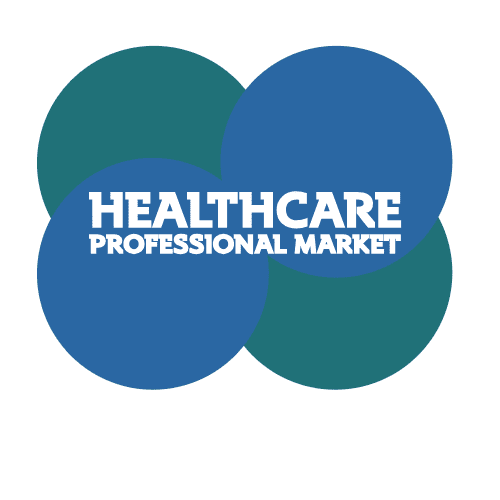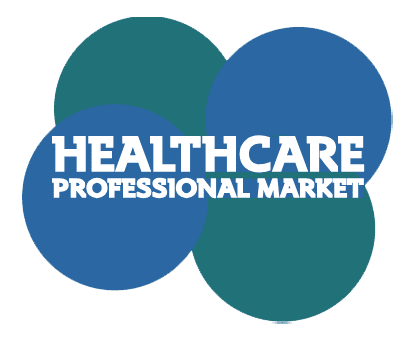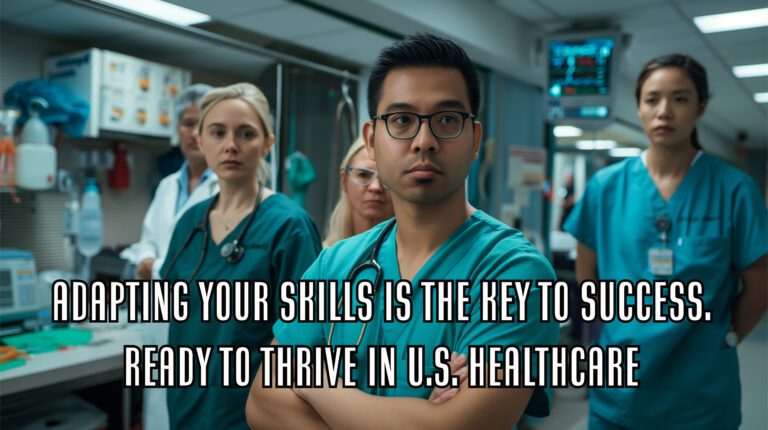Ideal Reader:
International-trained nurses must align their clinical expertise with U.S. healthcare protocols and expectations.
Target:
Nurses with strong clinical backgrounds transitioning to U.S. healthcare need guidance on adapting their skills to meet local standards and improve patient care.
Introduction:
- What You Will Learn: This article provides practical strategies for transitioning your clinical knowledge and experience into the U.S. healthcare system, focusing on understanding local nursing protocols, communication styles, and teamwork dynamics.
- Problems It Solves: Helps international nurses bridge the gap between their existing clinical expertise and the specific demands of U.S. nursing practice, ensuring smooth integration into healthcare settings.
Key Questions Answered:
- How can I apply my clinical skills in the U.S. healthcare environment?
- What additional skills or knowledge do I need to succeed?
- How do I adapt to the differences in nursing practice between my home country and the U.S.?
Challenging the Idea That Clinical Skills Alone Ensure Success
Challenging Assumptions:
Many international-trained nurses assume their clinical expertise will seamlessly transfer to U.S. healthcare. However, differences in patient care protocols, communication with healthcare teams, and regulatory expectations require additional adaptation (American Nurses Association [ANA], 2020). Applying your clinical skills may not be enough without understanding U.S.-specific protocols such as patient-centered care, evidence-based practice, and team-based collaboration (Institute for Healthcare Improvement [IHI], 2020).
Reframing the Idea:
Success in the U.S. healthcare system requires continuous learning and adapting clinical skills to align with local protocols. Understanding patient-centered care models, practicing evidence-based approaches, and mastering new communication techniques will elevate your clinical practice and enhance patient outcomes (ANA, 2020).
Adapting Your Clinical Skills to U.S. Healthcare
1. Evidence-Based Practice (EBP):
The U.S. healthcare system strongly emphasizes evidence-based practice (EBP), which integrates clinical expertise with the latest research to improve patient outcomes. International nurses may need to familiarize themselves with how EBP is implemented and how it influences care decisions (Melnyk & Fineout-Overholt, 2019). This includes applying research findings to nursing interventions, continuously evaluating practices, and staying updated with clinical guidelines.
Learn more about clinical protocols and EBP here.
2. Patient-Centered Care:
In the U.S., patient-centered care focuses on involving patients in decisions about their care. Nurses play a key role in advocating for patient preferences and ensuring that care plans reflect those preferences. This approach might differ from practices in other countries where decision-making is more physician-led (American Association of Critical-Care Nurses [AACN], 2020). Understanding this shift in responsibility is crucial for international-trained nurses.
Discover more about patient-centered care here.
3. Effective Communication and Collaboration:
U.S. healthcare emphasizes interdisciplinary collaboration, where nurses regularly communicate with physicians, specialists, and other healthcare team members to provide comprehensive care. Effective communication is essential for ensuring patient safety, coordinating care, and managing complex patient cases (IHI, 2020). Developing these communication skills is vital to integrating into the U.S. system.
Explore communication strategies for patient safety here.
4. Regulatory Compliance and Patient Safety:
U.S. nurses must adhere to strict regulatory standards to ensure patient safety. These standards include understanding infection control protocols, medication administration guidelines, and workplace safety regulations (Centers for Disease Control and Prevention [CDC], 2020). International-trained nurses must familiarize themselves with these regulations to ensure compliance and avoid legal issues.
Learn about patient safety guidelines here.
5. Cultural Competence in Patient Care:
U.S. healthcare serves a diverse patient population, making cultural competence an essential skill. Nurses must be able to provide care that respects patients’ cultural backgrounds, beliefs, and preferences. This requires sensitivity to diverse perspectives and an understanding of how culture can influence health behaviors and treatment acceptance (AACN, 2020).
Discover how to build cultural competence here.
Bridge the Gap Between Your Skills and U.S. Standards
Self-Assessment Tool:
Assess your readiness to practice in the U.S. healthcare environment by evaluating your knowledge of evidence-based practice, patient-centered care, and interdisciplinary collaboration. Use a self-assessment tool or checklist to identify areas for improvement.
Steps to Adapt Your Skills:
- Research U.S. Nursing Protocols: Familiarize yourself with key nursing guidelines, such as evidence-based practice models and patient safety protocols (Melnyk & Fineout-Overholt, 2019).
- Enroll in Continuing Education: Participate in workshops or online courses focused on U.S. standards, such as patient-centered care, clinical decision-making, and collaboration (IHI, 2020).
- Shadow U.S. Nurses: If possible, shadow nurses in U.S. healthcare settings to observe how they communicate with patients and other healthcare team members and implement evidence-based practices.
Overcoming Challenges
Common Objections:
- “I have been practicing for years; I do not need to learn new skills.”
- “It is too time-consuming to adapt to new systems while working.”
Response:
Continuous learning is essential in healthcare, particularly in a system like the U.S. that emphasizes research-driven care and interdisciplinary collaboration. By investing time in learning and adapting to local protocols, you ensure your success and the delivery of high-quality care to your patients (AACN, 2020). Moreover, aligning your practice with U.S. standards will enhance your career prospects.
Begin Adapting Your Skills Today
Take the First Step:
Begin by dedicating 30 minutes each day to researching U.S. evidence-based practice guidelines. Use this time to familiarize yourself with patient-centered care models and reflect on how they differ from your previous experience.
Ongoing Education:
Join professional organizations such as the American Nurses Association or the American Association of Critical-Care Nurses, which offer resources and continuing education to help international nurses align their skills with U.S. standards (ANA, 2020).
Explore the American Nurses Association here.
Visualize Your Future Success
Imagine yourself as a fully integrated healthcare professional in the U.S., confidently applying your clinical expertise while mastering local protocols, enhancing patient care, and collaborating effectively with your team. By adapting your skills, you will succeed in the U.S. healthcare environment, contribute to improved patient outcomes, and advance your nursing career.
References:
- American Association of Critical-Care Nurses. (2020). Patient-centered care and critical care nursing practice. https://www.aacn.org/patient-centered-care
- American Nurses Association. (2020). Continuing education and professional development for nurses. https://www.nursingworld.org/education-events/
- Centers for Disease Control and Prevention. (2020). Patient safety in healthcare settings. https://www.cdc.gov/patientsafety/index.html
- Institute for Healthcare Improvement. (2020). Effective communication and patient safety in healthcare. http://www.ihi.org/resources/Pages/HowtoImprove/default.aspx
- Melnyk, B. M., & Fineout-Overholt, E. (2019). Evidence-based practice in nursing & healthcare: A guide to best practice (4th ed.). Lippincott Williams & Wilkins.
Additional Resources:
- NCLEX-RN Exam Overview (NCSBN): https://www.ncsbn.org/nclex.page
- Clinical Protocols and Evidence-Based Practice (Agency for Healthcare Research and Quality): https://www.ahrq.gov/prevention/guidelines/index.html
- Effective Communication in Healthcare (Institute for Healthcare Improvement): https://www.ihi.org/insights/using-communications-strategies-accelerate-quality-improvement
- Medical Terminology for Healthcare Professions (MedlinePlus): https://medlineplus.gov/medwords/medicalwords.html
- Building Cultural Competency in Nursing (CDC): https://npin.cdc.gov/pages/cultural-competence-health-and-human-services


